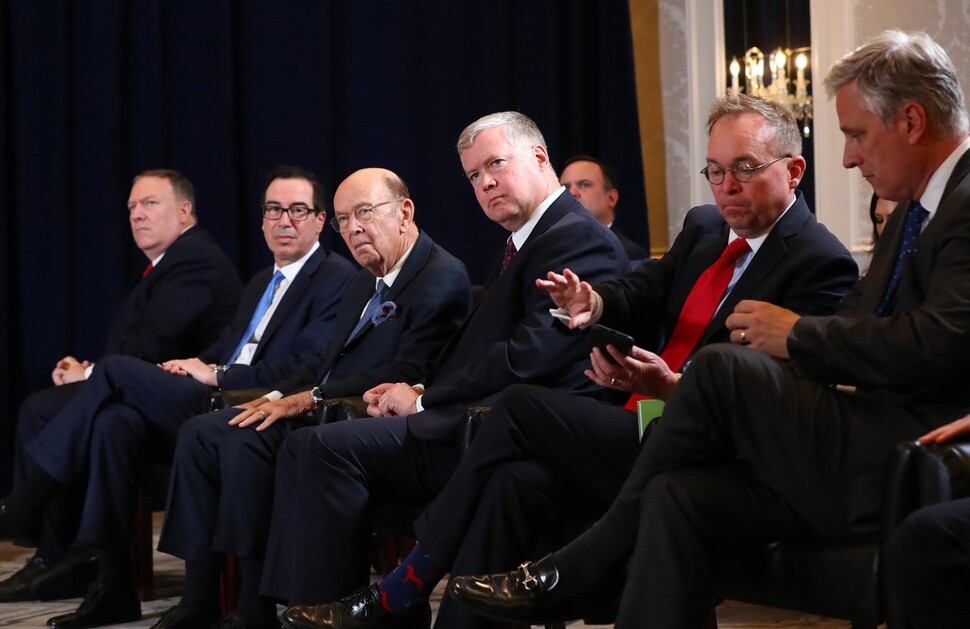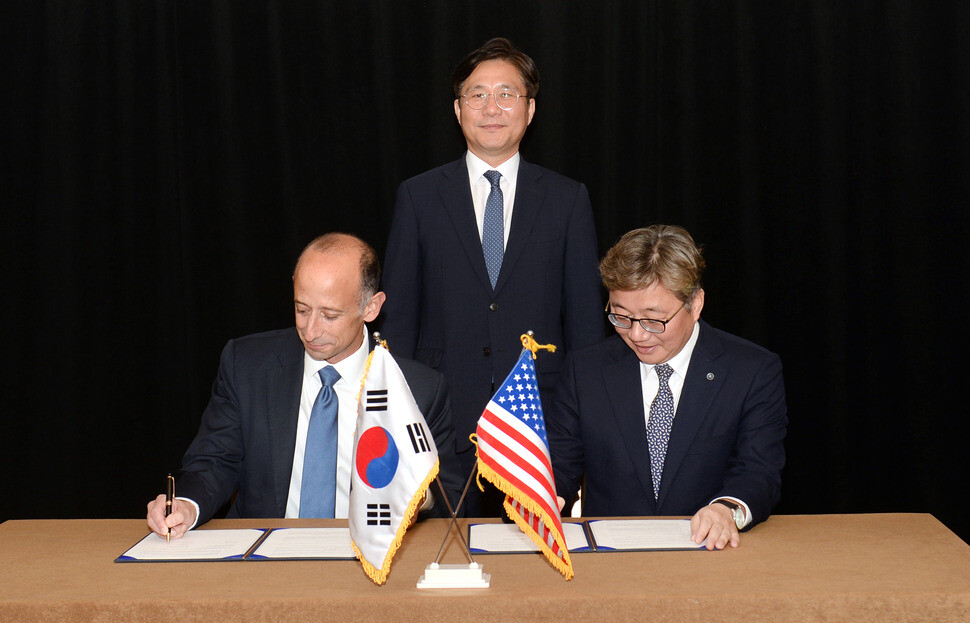hankyoreh
Links to other country sites 다른 나라 사이트 링크
Moon stresses “reciprocal alliance relationship” in summit with Trump

South Korean President Moon Jae-in stressed the importance of a “reciprocal alliance relationship” in his ninth summit with US President Donald Trump on the afternoon of Sept. 23. His message read as a call to leave behind the unilateral support and dependence that have characterized the alliance in the past and form a new relationship of “give and take” in areas such as the economy and security. It also echoes the position recently shared by the Blue House, which has signaled its hopes to “upgrade” the South Korea-US alliance.
Explaining the outcome of the summit, Blue House Spokesperson Ko Min-jung said the two leaders had “agreed to carry on and strengthen the South Korea-US alliance in a reciprocal and comprehensive direction, including economic cooperation between both sides.” The summit on Sept. 23 included contracts for South Korea’s introduction of US-produced LNG and cooperation between companies on both sides to develop self-driving vehicle technology, which are being seen as concrete attempts to reflect the two sides’ commitment to expanding economic cooperation beyond trade into energy and new growth industries.
A Blue House official said the two leaders reached an agreement to “help strengthen the South Korea-US alliance by achieving mutual and satisfactory results at the 11th round of defense cost sharing negotiations.” During the summit, Moon “explained in detail the contributions the South Korean government has made to the South Korea-US alliance and stable stationing of US Forces Korea, including increases in the defense budget and purchasing of US weapons and a steadily rising share of defense costs,” the official said – emphasizing that the “reciprocity” in the South Korea-US alliance extends to the area of security in addition to the economy.

The “reciprocal alliance” measure also ties in with the response to claims by critics about “fissures” in the alliance and trilateral security cooperation with Japan following the Blue House’s decision in August to terminate its General Security of Military Information Agreement (GSOMIA) with Japan. On Aug. 28, Second Deputy Director Kim Hyun-chong announced that Seoul would “upgrade the South Korea-US alliance to another level to strengthen our leading capabilities” while “contributing to the expanded security role that the US hopes for from the alliance.” In his remarks on the importance of upgrading the alliance, Kim stressed the need for military spy satellites and the building of light aircraft carriers and next-generation submersibles.
“The term ‘reciprocal alliance’ means reducing unilateral dependence on the alliance,” explained Lee Soo-hyoung, a senior research fellow at the Institute for National Security Strategy (INSS).
“Unlike the Cold War era, South Korea has now emerged as a middle power, and we’re working in that sense to build our defense capabilities with the transfer of wartime operational control and purchasing of US weapons,” Lee noted.
“In terms of our share of defense costs, that means examining the details and bearing a reasonable amount of costs,” he said.
The “reciprocal alliance” concept emerged amid changes in Washington’s national strategy following the 9/11 attacks in 2001. At the time, the George W. Bush administration pursued a national security strategy of demanding that its alliances with South Korea and others also contribute to the US’ national interest. In response, the Roh Moo-hyun administration also emphasized a “comprehensive, dynamic, and reciprocal alliance” in stressing the need to adjust the South Korea-US alliance’s role. Developments like the deployment of medical support units to Iraq and Afghanistan and the relocation of Yongsan Garrison and reassignment of USFK has also taken place amid the process of developing a “reciprocal alliance.”
By Noh Ji-won, staff reporter
Please direct comments or questions to [english@hani.co.kr]
Editorial・opinion
![[Column] Life on our Trisolaris [Column] Life on our Trisolaris](https://flexible.img.hani.co.kr/flexible/normal/500/300/imgdb/original/2024/0505/4817148682278544.jpg) [Column] Life on our Trisolaris
[Column] Life on our Trisolaris![[Editorial] Penalties for airing allegations against Korea’s first lady endanger free press [Editorial] Penalties for airing allegations against Korea’s first lady endanger free press](https://flexible.img.hani.co.kr/flexible/normal/500/300/imgdb/original/2024/0502/1817146398095106.jpg) [Editorial] Penalties for airing allegations against Korea’s first lady endanger free press
[Editorial] Penalties for airing allegations against Korea’s first lady endanger free press- [Editorial] Yoon must halt procurement of SM-3 interceptor missiles
- [Guest essay] Maybe Korea’s rapid population decline is an opportunity, not a crisis
- [Column] Can Yoon steer diplomacy with Russia, China back on track?
- [Column] Season 2 of special prosecutor probe may be coming to Korea soon
- [Column] Park Geun-hye déjà vu in Yoon Suk-yeol
- [Editorial] New weight of N. Korea’s nuclear threats makes dialogue all the more urgent
- [Guest essay] The real reason Korea’s new right wants to dub Rhee a founding father
- [Column] ‘Choson’: Is it time we start referring to N. Korea in its own terms?
Most viewed articles
- 160% of young Koreans see no need to have kids after marriage
- 2[Column] Life on our Trisolaris
- 3[Reporter’s notebook] In Min’s world, she’s the artist — and NewJeans is her art
- 4Hybe-Ador dispute shines light on pervasive issues behind K-pop’s tidy facade
- 5[Editorial] Penalties for airing allegations against Korea’s first lady endanger free press
- 6Presidential office warns of veto in response to opposition passing special counsel probe act
- 7Vietnamese war victims speak of sexual violence by S. Korean troops for the first time
- 8S. Korea discusses participation in defense development with AUKUS alliance
- 9Japan says it’s not pressuring Naver to sell Line, but Korean insiders say otherwise
- 10Months and months of overdue wages are pushing migrant workers in Korea into debt